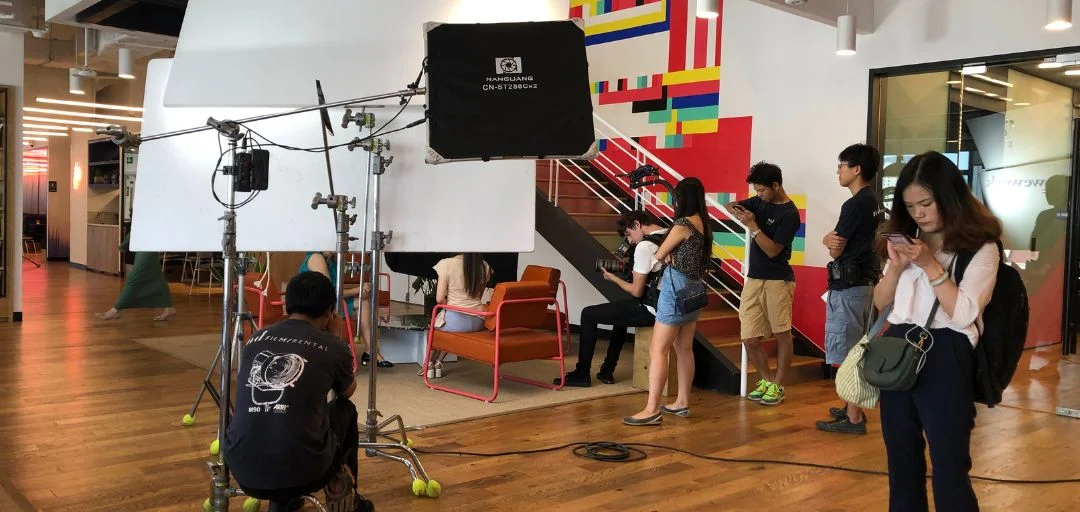
Filming in the France - Film, Video, Documentary, Crews and Popular Locations France
 We also do more than filming. Need event management in France? We handle that too. Want to launch a brand video? As a top production company in France, we work with both agencies and direct clients. Need help with ads? Our links to French advertising companies, creative agencies in France, and advertising agencies in France mean you get full support from idea to final cut.
At World Production Service, we're here to make things easy. From scouting to shooting, we help at every step. Whether you need a France film production company, a fixer in France, or just a good videographer in Paris, we connect you with the right people.
So, if you're ready to start your next shoot in France, we're ready too. Let's make your vision come alive - on time, on budget, and on point.
We also do more than filming. Need event management in France? We handle that too. Want to launch a brand video? As a top production company in France, we work with both agencies and direct clients. Need help with ads? Our links to French advertising companies, creative agencies in France, and advertising agencies in France mean you get full support from idea to final cut.
At World Production Service, we're here to make things easy. From scouting to shooting, we help at every step. Whether you need a France film production company, a fixer in France, or just a good videographer in Paris, we connect you with the right people.
So, if you're ready to start your next shoot in France, we're ready too. Let's make your vision come alive - on time, on budget, and on point.
Weather in France
Planning to film in France? Then let’s talk weather – it can make or break your shoot.
France has four seasons, and each one paints a different picture. Spring (March to May) brings fresh blooms, soft light, and pleasant temperatures – perfect for outdoor filming. This is a favorite time for our video crew in France, especially for shoots in gardens, vineyards, and streets lined with flowers. Filming in Paris during spring? Expect charming views, but don’t forget a rain jacket – Paris likes a light drizzle.
Summer (June to August) is warm and sunny. Coastal areas like Nice and Marseille glow under the sun. The South of France is ideal for lifestyle and fashion shoots. Our camera crew in France often captures that golden hour magic by the sea. Just be aware: it’s also peak tourist season. We help navigate the crowds and find quieter spots.
Autumn (September to November) is all about color. Leaves turn orange and red – great for dramatic shots. Our fixer in France knows the best countryside spots to catch the changing season.
Winter (December to February)? Think snowy Alps, cozy streets, and moody skies. Perfect for commercials and dramatic scenes. Videographers in France love shooting in the French mountains or old towns covered in snow.
No matter the season, we track weather patterns for you. Our fixer in Paris, cameraman in France, and photographer in France stay prepared. You get the best light, the best moment – and no surprises.
Let the weather work for your story, not against it.
Filming Locations in France
France is a filmmaker’s playground. Whether you’re after romance, history, nature, or modern vibes – France has it all. Our job at World Production Service is to guide you to the perfect place and connect you with the right video crew in France.
Let’s start with the obvious – filming in Paris. The Eiffel Tower, cobbled alleys, rooftop cafés, the Seine River… it’s pure cinematic gold. With a local fixer in Paris, camera crew in Paris, and videographer in Paris, we make your Paris shoot smooth and stress-free.
Looking for sunny shots? Head to the French Riviera – Nice, Cannes, and Marseille. The light is golden, the sea is sparkling, and the towns are full of charm. Lifestyle, fashion, or luxury brands? This is the spot.
For historical settings, try Normandy or the Loire Valley. Think ancient castles, stone bridges, and winding roads. Our fixer in France helps secure access to heritage sites so your crew gets the shot – legally and easily.
Want rural beauty? Provence gives you lavender fields, olive groves, and pastel villages. It’s perfect for peaceful scenes. Or shoot in Brittany for cliffs, wild beaches, and moody skies – a documentary dream.
And yes, France has mountains too. The Alps and Pyrenees offer snowy peaks and alpine towns. Ideal for winter ads or sports videos. Our camera crew in France and cameraman in France are used to filming in challenging weather and terrain.
No matter your vision, France delivers. And with a trusted French film company by your side, every shoot becomes a smooth adventure.
Studio Rental and Film Backlots in France
Need full control over your shoot? French film studios and movie backlots offer the perfect setup. Whether you’re filming a TV commercial, movie, or branded content, France has modern, well-equipped studios that suit every kind of production.
In and around Paris, you’ll find some of the most advanced French movie studios – like Studios de Paris and Bry-sur-Marne. These spaces offer sound stages, green screens, set construction zones, and post-production support. Working with a fixer in Paris, we can help book the space that fits your needs and budget.
For bigger productions, head south. The Provence-Alpes-Côte d’Azur region is home to large-scale facilities with full backlots and scenic surroundings. These are ideal when you want indoor and outdoor spaces within one location. With our production company in France, we’ll coordinate everything – permits, crew, and scheduling.
Need specialized setups? Many France film production companies and creative agencies in France use modular studios for product shoots, fashion videos, and virtual productions. With a skilled video crew in France and reliable equipment rental, we make sure you’re camera-ready from day one.
So whether you’re using a local videographer in France or a full camera crew in France, filming in a French studio gives you control, privacy, and pro-level resources.
Advanced Filming Cities in France
France has many cities that are ready for film. These places have great spots, good roads, and all the gear you need. Plus, the people there know how to help film crews work fast and easily.
Paris is the top choice. It’s full of beauty, lights, and energy. With a strong video crew in Paris and a trusted fixer in Paris, filming here is smooth. You also get help from top French film companies and studios nearby.
Next is Lyon. This city has both old and new styles. It’s clean, calm, and easy to move around. Many France film production companies like working here. Need a videographer in France or a quick permit? Lyon is a smart pick.
Marseille is bright and full of color. You get sea views, sunny skies, and a strong local camera crew in France. It’s great for ads, fashion, and music videos.
Then there’s Nice, a gem by the sea. It’s a favorite for luxury shoots and sunny outdoor scenes.
All these cities have skilled crews, great places to film, and support from local teams. When you work with our production company in France, your shoot gets done right – fast, safe, and easy.
Past Productions in France
France has been the home of many great films and shows. Big names and famous stories have been shot here. The country’s beauty, old buildings, and modern cities make it a top pick for filmmakers.
Many Hollywood movies have been filmed in Paris. Think of scenes with the Eiffel Tower, pretty bridges, and busy streets. With the help of a local fixer in Paris, film crews work fast and get the shots they want. Our video crew in Paris and camera crew in Paris have worked on ads, shows, and even big movies.
Other cities like Nice, Lyon, and Marseille have also been used in TV shows, music videos, and brand films. A sunny beach in Nice? A cozy street in Lyon? A cool port in Marseille? All perfect for shooting. Our videographer in France and photographer in France often work in these places with top brands and directors.
Documentaries also love France. The country has a deep history and lovely nature. Many teams choose us for filming in France because we know the places, the rules, and the people. We’ve helped teams shoot in old castles, farms, cities, and even the Alps!
Even animated films and VFX-heavy scenes have been made here. With modern French film studios and smart tech teams, France is ready for anything.
Our work with France film production companies, French advertising companies, and global brands means your project is in safe hands. We know what works – and what doesn’t.
When you choose World Production Service, you join the long list of happy creators who loved filming in France.
Cost of Filming in France
Filming in France can fit many budgets. Big or small, there’s a way to make it work.
If you’re shooting in Paris, it may cost more than other cities. But you also get top spots, pro crews, and easy gear rental. With the help of a local fixer in Paris, we make sure you don’t waste time or money.
Smaller cities like Lyon or Nice can be cheaper. They still offer great views, smart crews, and good gear. Our camera crew in France and video crew in France work fast and smart to keep things on track.
You can rent studios, lights, cameras, and even drones. We work with trusted France film production companies and French film studios to get you good deals.
Want to know the full cost? We build a clear plan with no hidden fees.
At World Production Service, we help you save time and money – while keeping your shoot top quality.
Sensitive Regions in France
Some places in France need extra care when filming. These are called sensitive regions. They may need special rules, permits, or local help. Don’t worry – we’re here to guide you.
Paris is busy and full of life. But filming in some spots – like near the Eiffel Tower or famous museums – may need permission. That’s where a trusted fixer in Paris comes in. We help you get what you need.
Military areas, government buildings, and airports are also sensitive. You can’t just show up with a camera. But with a smart plan and the right paperwork, we can help you get access.
Nature parks and historic sites – like castles and old towns – often have rules to protect them. You may need a guide or time limits for your shoot. Our camera crew in France and video crew in France know how to work fast while following the rules.
In some small towns, you may need to talk with the mayor’s office. No stress – our local fixer in France will handle it.
Also, drones are not allowed in many spots without special approval. If you need aerial shots, we’ll help you follow drone laws.
At World Production Service, we make sure filming in sensitive regions in France goes smoothly. With our help, your French film company, advertising agency in France, or crew can focus on creating – while we take care of the rest.
Visa & Permit for Filming in France
To film in France, you may need a visa or a permit – depending on where you’re from and what you plan to shoot. But don’t worry. We make it easy.
If your team is from the EU, you usually don’t need a visa. You can come in and start filming with no problem. If you’re from outside the EU, like the US or Canada, a short-stay visa may be enough. It lets you stay in France for up to 90 days.
Need to stay longer? You’ll need a long-stay visa. We help you apply and get the documents ready.
Permits are a little different. Many places in France need a permit to film. For example, if you want to shoot in the streets of Paris, in front of the Eiffel Tower, or inside a museum, you’ll need permission. Our fixer in Paris will take care of this for you.
For drones, you must follow strict rules. Flying without a permit can get you in trouble. We know the laws and help you fly safe and legal.
In small towns or rural areas, things are easier. You often just need to let the town office know. Our fixer in France will handle the talks, the forms, and the timing.
Here’s what we help with:
• Finding out if you need a visa
• Helping you apply for a visa
• Getting location permits
• Working with local police or town offices
• Setting up insurance and safety checks
• Helping with customs if you bring gear into France
Working with World Production Service means less stress for you. We team up with local offices, France film production companies, and creative agencies in France to keep everything legal and simple.
Whether it’s a short video shoot or a full film, we make sure your camera crew in France, videographer in France, or photographer in France can work without delays.
Crew in France
A great film needs a great crew. And in France, you’ll find some of the best people to help bring your story to life.
At World Production Service, we connect you with skilled, local talent. Whether you need a full video crew in France or just one cameraman in France, we’ve got you covered. Our crews are fast, friendly, and know how to get the job done.
Need a fixer in France? They’ll plan, guide, and solve problems on set. From getting permits to finding extras, they handle it all.
Here are just some of the crew members we provide:
• Director of Photography (DOP) – sets up the look and lighting
• Camera Operator – runs the camera and captures the best shots
• Sound Technician – makes sure your audio is clean and clear
• Gaffer – handles lights and power
• Grip – moves gear and helps with setup
• Makeup Artist – makes your cast look camera-ready
• Production Assistant – helps with small but key tasks
Shooting in Paris? We’ll send a video crew in Paris, including a local fixer in Paris. They know the streets, the rules, and how to avoid delays.
In other cities like Nice, Lyon, or Marseille, we work with trusted professionals too. All our crew members speak English and French, so you can work easily with the team.
We’ve worked with many France film production companies, French advertising companies, and creative agencies in France. So we know who’s good – and who’s great.
No matter your project size, we build a strong team that fits your needs. From a single videographer in France to a full crew, we make it simple.
With World Production Service, your filming team is ready to roll.
Art Department in France
The art department makes your shoot look amazing. They handle the colors, props, sets, and style. In France, we work with top people who bring every scene to life.
Need a pretty café in Paris? Or an old castle room? The art team will dress the space to match your story. From big film sets to small ads, they make it all look real and beautiful.
Here’s who you’ll find in a great art team:
• Production Designer – creates the full look of the film
• Art Director – helps plan and manage the set design
• Set Decorator – picks and places props, furniture, and small details
• Props Master – finds or makes objects your actors use
• Set Dressers – set things up before filming starts
Our team works with your camera crew in France, videographer in France, or photographer in France to match the style and lighting. Everyone works as one.
If you’re filming in a studio, we bring in set builders too. Many French film studios and France film production companies already have great resources on-site.
At World Production Service, we help you find the right art crew fast. From design to decoration, your scenes will stand out.
Equipment Rental in France
Need gear for your shoot? No problem. France has everything you need – ready to rent. From lights to lenses, it’s all here.
Whether you’re filming in Paris or a quiet village, we help you find the right tools. Our team works with top rental houses across the country. These places offer gear that’s clean, tested, and ready to use.
Here’s what you can rent:
• Cameras – From small DSLRs to big cinema cameras
• Lenses – Wide, zoom, prime – you name it
• Lighting – Soft lights, LEDs, stands, and more
• Sound gear – Boom mics, wireless kits, mixers
• Drones – For cool shots from the sky (we help with drone permits too)
• Monitors – So you can watch the action live
• Grips and Rigs – Sliders, gimbals, tripods, and dollies
• Generators – For power when you’re far from outlets
Need help running the gear? Our camera crew in France and videographer in France know how to set it all up. Don’t worry if you’re new to the gear – we’ll walk you through it.
Filming in Paris? We’ll get your gear delivered right to your set. Fast and easy. With a fixer in Paris, the whole process stays smooth. Shooting in Lyon, Nice, or Marseille? Same deal – great service, local support.
All rentals come from trusted suppliers. We only use companies that France film production companies and creative agencies in France rely on. That means no surprises, no delays.
Need something special? A camera car? A rain machine? We can get that too. Just tell us what you need, and we’ll handle the rest.
At World Production Service, we keep filming simple. Good gear. Good help. Good results.
Talents and Casting in France
Need people for your film or video? France has amazing talent. From actors to extras, models to voice artists – you’ll find them here.
Whether you need a child actor, a fashion model, or a shop owner who can act for a quick scene, we can help. We work with top casting agents across the country. These experts find the right faces fast.
Filming in Paris? Great! The city is full of trained actors, dancers, and performers. Our fixer in Paris will set up casting calls or send you videos to pick from. You can also meet the talent in person.
We also work in cities like Nice, Lyon, and Marseille. You’ll get access to local people who fit your story and speak your language.
Need extras for a crowd scene? Or a real chef for a food shoot? We’ve got you. From street looks to high fashion, France has it all.
We also help with contracts, payments, and schedules. So your cast shows up on time – ready to go.
At World Production Service, we make casting easy. With help from our trusted France film production company partners and advertising agencies in France, we match you with talent that fits your vision.
Post-production and Animation/VFX in France
Once the filming is done, it’s time to bring your story to life. France has top teams for post-production, animation, and VFX.
Need to cut your film? Add music? Fix colors? We help you do it all. Our partners include skilled editors, sound mixers, and color experts. They work fast and know how to make your video look great.
Want animation? France is known for it. From fun cartoons to smart explainer videos, we team up with the best French video companies and creative agencies in France to build the right look for your brand or story.
Need special effects? Our France film production company network includes VFX artists who create explosions, flying cars, or magic spells – whatever your film needs.
Here’s what we offer:
• Video editing – fast cuts, smooth flow
• Color grading – bright, bold, or dark and moody
• Sound design – clean voices, cool effects
• Subtitles and voice-over – in any language you want
• 2D and 3D animation – for ads, films, or music videos
• VFX – for big action or quiet beauty
You don’t need to be in France to finish your video here. We send files online, do live reviews, and keep you updated step by step.
With World Production Service, your work is safe and smooth from start to finish. You film with a great camera crew in France and finish with amazing post-work by the best in the business.
Let’s create something great – together.
Crew In France
Projects In France
Portfolio In France
BTS In France

 Connect with our producers on WhatsApp to go through your needs in real time.
Connect with our producers on WhatsApp to go through your needs in real time.
 Chat with our producers on WeChat for instant communication and quick support.
Chat with our producers on WeChat for instant communication and quick support.
 Send us your inquiry via email. Our team will respond within 12 hours.
Send us your inquiry via email. Our team will respond within 12 hours.
 Start a live chat with our support team to get immediate help online.
Start a live chat with our support team to get immediate help online.




 Filming Facility:
Filming Facility: 